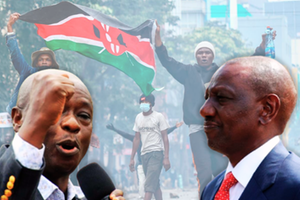
National Cohesion and Integration Commission(NCIC) Commissioner Danvas Makori, Vice Chairperson Wambui Nyutu and acting CEO Harrison Kariuki during a press briefing at the Commission's offices at Britam Towers, Upper Hill on July 14, 2023.
Lawmakers are expected to consider tough proposals that could see those who spew hate speech banned from holding public office for at least five years.
The MPs have started considering proposals that seek to amend the National Cohesion and Integration Commission (NCIC) Act 2018 in 2022, but progress on the implementation of the tough changes has been slow.
The consideration of the proposals is expected to proceed to the second reading when MPs resume session next month.
Among the proposals sent to Parliament by the NCIC during the consideration of the National Cohesion and Integration Bill, 2023 is to increase the jail term for those found guilty of hate speech from the current maximum of five years to a minimum of five years and a maximum of 10 years with a minimum fine of Sh10 million.
"Any print, electronic, digital and social media or other media company that publishes or otherwise disseminates any of the acts under subsection (1) on any platform commits an offence and shall be liable on conviction to a fine of not less than ten million shillings or to imprisonment for a term of not less than ten years, or to both," reads the NCIC proposal.
However, the MPs want any person who uses threatening, abusive or insulting words or behaviour or displays, publishes, posts or distributes written material in print, electronic or social media to be liable to a fine of Sh1 million.
The Bill, sponsored by National Cohesion and Equal Opportunities Committee Chairman Adan Haji Yusuf, defines ethnic hatred as hatred against a group of persons defined by reference to colour, race, clan, sub-tribe, nationality, ethnic or national origin.
In its proposals to Parliament, the commission also wants people found guilty of hate speech to be disqualified from being nominated or elected to any position for at least five years.
In the draft law, anybody found guilty will be permanently disqualified from holding public office.
"Any person convicted of an offence under this section shall be disqualified from holding any public office, whether nominated or elective, for a period of five years," the NCIC proposals read.
The commission also wants hate speech cases to be concluded within six months.
Lawmakers will also consider a proposal to make it a criminal offence to disobey a summons issued by the NCIC, a move aimed at making the commission more powerful in carrying out its mandate.
"A person who fails to obey a summons or fails to give his correct name and address and answer truthfully all questions lawfully put to him commits an offence and shall be liable on conviction to a fine not exceeding one million shillings or to imprisonment for a term not exceeding 12 months or to both," reads a proposal from NCIC.
NCIC commissioner Danvas Makori told the Nation on Wednesday January 15 that most of the proposals had already been adopted at the committee level and were awaiting consideration by the House when it resumes sitting next month.
"All these proposals have been adopted by the committee and we have added more, they have even passed the first reading. We hope that they will be considered when MPs resume," said Mr Makori.
The consideration of the proposals comes at a time when some political leaders have been criticised for making divisive statements that not only border on hate speech, but also do not promote national cohesion.
Kapseret MP Oscar Sudi, William Kamket (Tiaty) and his Dadaab counterpart Farah Maalim are among the leaders who have recently made statements during political rallies claiming that President William Ruto will get a second term through the ballot box or any other means.
Mr Sudi, who has never shied away from making controversial statements, also recently declared that President Ruto will not serve a single term, claiming that no single Kenyan tribe should feel entitled to lead Kenyans.
Using unprintable expletives, Mr Maalim defended President Ruto and warned government critics.
Just last year, at the height of the Gen Z protests, Mr Maalim was summoned by the NCIC after making controversial remarks about the young protesters, claiming he would have killed 5,000 of them for taking part in the anti-government demonstrations.
Under Article 96 of the Penal Code, those found guilty of propagating hate speech are liable to imprisonment for up to five years.
However, a lack of clarity on the admissibility of technological evidence makes it difficult for prosecutors to nail suspects.
A review of past hate speech cases shows that most were dropped for lack of evidence. Others were dropped because the prosecution was unable to produce people who witnessed the accused making inflammatory statements, especially when they were made public through videos taken from the internet.
Some of those accused of hate speech have walked free after challenging the constitutionality of the very law that criminalises ethnic hatred, saying it goes against the spirit of the Constitution.










